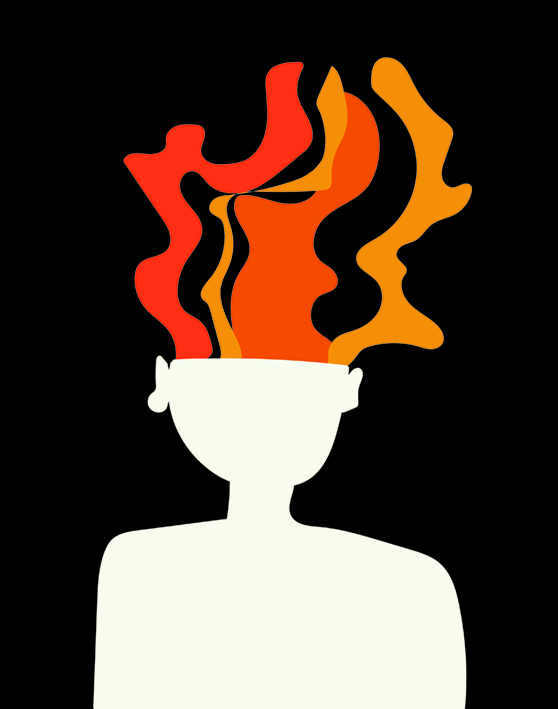Our daughter was conceived the weekend before the 2016 election. Her now-corporeal form was just beginning to crystalize, zygote to embryo, at the same time that an archaic electoral college, a clickbaiting mainstream media, and a swarm of Russian bots colluded to hand the White House to the straight white male with perhaps the most unearned privilege in human history.
Eight months and one week later, our daughter was born. When she was only a day old, the lead nurse on duty commented on my daughter’s strength. Even though she was born three weeks early, she was healthy and robust.
“Infant girls tend to be a lot stronger than infant boys,” the nurse said to us.
“Interesting,” I replied. “Didn’t know that was a general trend.” “It is,” she said. “And actually, infant white boys tend to be the most fragile group of all.”
“Are you serious?” I marveled at the vast developmental and cultural implications of what she was saying. “Is this widely known? Is there research? Because that would, like . . . explain so much about the world.” The nurse just shrugged. Behind the elder white nurse, a younger nurse, a woman of color, just chuckled knowingly.
In the Buddhist tradition that I practice and teach, all our psychological problems begin with an unwillingness to be present. What does “being present” really mean? It usually doesn’t mean laser-like focus, necessarily being calm and tranquil. If you decide to take up a meditation practice in today’s world, good luck with the wish to always be calm and tranquil. Most of us think of mediation as a sort of cool ancient sedative, and when we try it, we wonder why we just can’t shut off our thoughts and feelings. Maybe we wanted some sort of mental anesthesia, but instead, mindfulness shines a light on the often uncomfortable crevices of our lived experience.
For any inhabitant of a human nervous system, the present moment includes perceptions and feelings which are often uncomfortable, and noticing them brings up emotions and sensations of anxiety about our identity and role in the world. For this reason, being present requires a strong commitment to become more vulnerable toward our own feelings. As we familiarize ourselves with our vulnerability (the spaces of our mind and life that don’t feel so Instagramable), we grow more confident in our ability to deal with our entire humanity, without leaving any part of ourselves out—including the ones that don’t feel good.
But along the journey of mindfulness, the feeling of discomfort never goes away. Instead, as we practice, we learn how to shield ourselves from it less and less. It is this acquired shielding, a dense layer of rusted armor that we carry through the world, which creates suffering for ourselves and others. This defensiveness also makes us increasingly fragile whenever feedback threatens to pierce our heavy armor. Noticing the weight of our egoic shielding and spending brief moments letting our skin breathe freely is the path of mindfulness, a path in which fragility is gradually replaced with a confident willingness to make yourself vulnerable, simply by growing more attuned to what we feel moment by moment.
Right now, in early 2019, is quite the opportune moment for the white male who has been wearing a heavy coat of armor to practice removing it. If we are willing to self-reflect on the fragility of our defenses—and the various compensations of our embodiment—we must do so wholeheartedly. Of course, we don’t have to practice or grow more vulnerable. The very bad news for everyone is that white guys don’t really have to do any spiritual work we don’t want to do. That’s the whole point of structural privilege and power: They help shield you from the need to ever confront your own discomfort.
As a modern Buddhist thinker, I often get asked for the Buddhist perspective on this Trump era, because the moment feels so simultaneously scary and surreal. Spiritually, I believe Trump’s illegitimate power represents what happens when powerful white men engage in literally zero self-reflection. At least 62 percent of us white guys chose this route in the ballot box in 2016, according to both Pew and CNN. Three years later, many of my progressive friends still shout at their TV screens and Twitter feeds with exclamations of shock and awe: “He has been caught telling thousands of lies. How can his supporters believe anything he says???!!!!”
After trying to engage many of his backers in discussions over the past four years, I don’t think Trump’s remaining supporters believe his words. I really don’t. I believe they mostly admire his commitment to a worldview, regardless of the existence of the world to which that view would apply.
Trump goes all the way in on his phenomenal white male delusion, unapologetically. And it is precisely this all-in lack of apology for lying that strikes such an ironic note of authenticity. It is exactly because he lies with such an unwavering commitment that he appears to those who still follow his cult as an honest leader. To those familiar with the abusive patriarch genre, his approach is totally trustworthy. Trump is quite literally the white male’s pill of delusion, except in this particular Matrix, their blue pill is a red hat.
But this writing isn’t for those white males who follow him; I have learned they aren’t my audience, and also that they aren’t (generally) interested in discussing their human vulnerability with mindfulness—at least not yet. My favorite T-shirt from the Trump 2016 campaign simply says “Fuck Your Feelings,” which is perhaps the most anti-mindfulness sentiment that could ever be placed on merchandise. You have to respect the psychological directness of such a message. You can only have a genuine conversation when both parties want to become more vulnerable. All else is wishful thinking.
Our problem, to state it for brevity’s sake perhaps too simply, is that we benefit from the system of white male supremacy, but we’d like to accrue cultural credit for aligning ourselves against it.
I live and teach in what I lovingly refer to as the “Kale Belt,” that swath of North American cities where yoga, meditation, and a good kale salad have all grown in popularity in recent years. My cohort are the progressive white males who like to identify ourselves as allies, the “good” guys, the ones who convince ourselves we are trying our best, the ones who think we probably “get it” and try to call out the other (white) guys who don’t. We are the ones who may have read a book by Ta-Nehisi Coates, the ones who make sure to post something on #InternationalWomensDay, the ones who retweet everything Alexandria Ocasio-Cortez posts and pretend it’s not because we have a crush on her. That’s the kind of white guy I like to fancy myself, and other white guys reading this—well, you’re my people.
Our problem, us progressively educated “ally” white dudes, is not that we are secretly wearing red hats. We wouldn’t be caught dead. Our problem, to state it for brevity’s sake perhaps too simply, is that we benefit from the system of white male supremacy, but we’d like to accrue cultural credit for aligning ourselves against it. Or to state our confusion less cynically: We actually do want the world to become a more just and equitable place, but it’s hard to come to terms with how deeply embedded in our habitual experience the current system has become. Even harder is beginning the process of extrication, figuring out how to make significant progress in dismantling the current system. And this is the heartbreak I repeatedly discover within myself. My desire to uplift others is constantly set against my habitual comfort with having a secure role in the world as it exists now. I am not all-in on things as they are, but I just can’t step out, either. And therein lies our rub.
The armor we “ally” dudes wear, even a long time after our fragile infancies, is a bit subtler than that of our conservative male counterparts. We don’t say “Fuck Your Feelings” when someone challenges our positional comfort. Saying a straightforward NO to anyone who questions our privileged place in the world is too brutishly unsubtle, too outrageously Brett Kavanaugh, too unorganic. Instead of saying NO, we respond to the challenge to self-reflect on our unearned privilege with a much more useful defense mechanism: a series of strategically placed “Yes, buts . . . ”
Last year, a few of the powerful men I looked up to most in the spiritual and political arenas, including the head teacher of my worldwide Buddhist community, were called out very publicly by the #MeToo movement for harm caused to women in their lives, and subsequently removed from their seats of power. Trying to apply my mindfulness practice in responding to these painful events, I attempted to open myself up to more general and direct feedback from colleagues, students, mentors, family, and others. A colleague and friend of mine in the Buddhist teaching community who is both black and queer took me up on this offer. They generously told me I had helped them a lot (my fragile male ego appreciated the compliment), but they also wanted to share that they had felt sometimes I didn’t listen well. They had also heard from several women in the community that because I considered myself a “good guy,” I sometimes presented myself as knowing more than others about the lived experiences of those with different embodiments. In other words, Mansplaining: The Progressive Buddhist Teacher edition. This was painful for me to hear about myself. It was especially uncomfortable because of my desire to be seen as skilled in exactly the area I was being told I needed to work on. I desperately wanted to be seen as one of the “good” ones, not one of the ones who just doesn’t “get it.” After all, which progressive straight white guy from the Kale Belt wouldn’t want his queer black friends to say universally positive (and quotable) things about him?
My initial instinct was to grab my “Yes, but” shield. I wanted to say “Yes, but . . . you know, listening is the majority of what I do every day. It’s why I’m good at what I do! The majority of the people I work with are women! They compliment my listening skills all the damn time!” And so forth. In other words, my internal reaction to the loving feedback that I myself had requested from my colleague—feedback which told me I didn’t always listen well—was to have a very hard time listening. This defensive mode is not where any of us are at our most awake. It is far too fragile, and not nearly vulnerable enough.
There is nothing more “progressive white male” than this subtle mode of self-defense. We’d each like to pretend it just doesn’t exist. Luckily, thanks to tools of mindfulness, in this particular instance I was able to pause before responding and thank my colleague for sharing that feedback with me, feedback I would do my very best to take it to heart. Sometimes, I’m not so lucky. Often my “Yes, but” reaction takes over on autopilot. In the spaces of social media and all of its erratic dialogues, you can quickly spot the progressive white male moving into our “Yes, but” mode. It often starts with what looks like a good intention—to bring nuance, shades of gray, or underrepresented data points into a cultural or political discussion that feels overly generic or too simplistic. But it often proceeds as a sort of undermining devil’s advocacy, an obsessive need to make some minor point, a need which steals the stage from those with less privilege, claiming back our spotlight even while we say we want others to shine. Far too often, our “Yes, but” observation only serves to undercut the basic wisdom of another person’s meaningful truth. We end up stealing voice from someone who has less opportunity than us to be heard or seen, which is of little or no benefit to anyone.
If there is anything that mindfulness can teach us white males in this moment, it’s to observe our “Yes, but” mind-states as they arise. Before you react, and share a perspective which is already louder than it should be because of social conditioning, you can pause and question whether or not the brilliant counterargument you want to bring to the discussion truly adds something necessary. The next time you hear a “Yes, but” coming on in your mind, you can ask the following questions: Is this the right time to say something, and am I the right person to say it? These are wonderful contemplations to ask before we grab back the proverbial mic, one which society has handed to us far too easily, especially when we can easily work to amplify other people’s meaningful messages instead.
These days, I find that my “Yes, but” states of mind are almost always more of an obstacle than a benefit to both myself and others. In the Buddhist tradition, it isn’t considered appropriate for a teacher to offer teachings unless they have been requested to do so. So these days, I try to practice waiting until somebody asks for my guidance—or at least my opinion— before contradicting an ally to make some point that doesn’t matter much, except within the overpriced real estate of my ego.
Our daughter now closes in on her second birthday, and I long for her generation to inherit a world where voice and power are shared more justly, more sanely, more compassionately. Her demeanor is generally strong, vocal, and brave—it’s only gotten stronger since her early arrival to the outside world at this pivotal moment in history. We gave her the middle name Atlas, because we always liked the name, but also because we felt it depicted the heroic strength the coming generation is going to need to hold up the sky and set this world on a new course.
Perhaps right now, the outer job of the progressive white male is to truly support the voices of those who need to be heard, without the need for our PR machines to dominate the discussion. Perhaps our inner work is to transform fragility into vulnerability, and to truly understand the harm we cause, greater than the harm caused by any other group in human history, when we don’t see our own defensiveness—or our own minds—clearly.
Ethan Nichtern is a senior Buddhist teacher, He is the author of The Road Home: A Contemporary Exploration of the Buddhist Path, The Dharma of The Princess Bride, and One City: A Declaration of Interdependence. Ethan is also the founder and former director of The Interdependence Project, an organization dedicated to Buddhist- inspired meditation and psychology, transformational activism, mindful arts, and meaningful media. He teaches and lectures around the world and is based in New York City.






